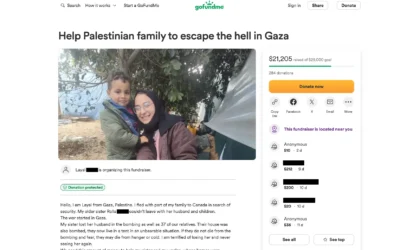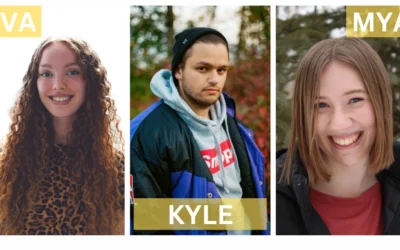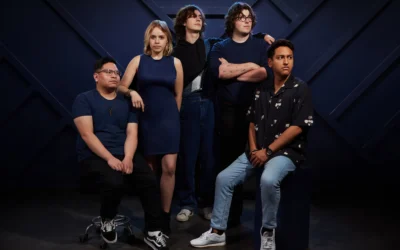Tegan and Sara will be on campus at MacEwan University on Oct. 26 as part of the SAMU Speaker Series. Vivek Shraya will act as moderator as Tegan and Sara talk about their personal experiences of finding identity, self-expression, and authenticity.
Ahead of the Speaker Series appearance, the griff had the chance to speak with Tegan Quin over the phone.
Milo Knauer: After scouring the web and watching videos that span two decades and eight albums worth of material, I quickly realized that the two of you have not seemed to age whatsoever in last 20 years of making music. What is your secret? Have you found the fountain of youth in pop music?
Tegan Quin: It’s a good question actually, I think to some people that the fact that we’ve successful for so long is a sign that we’ve actually signed our souls to the devil and that is why in fact we are not aging. Actually, I think it’s just genetics and the fact that we dress like teenage boys. About 12 years ago, we started to think about how not only to have a successful career but also how to tour while balancing our lives and keeping our health. We have reputation for having a zero drug policy and no hard liquor on the rider because we definitely consider touring as a career. Like if I was dentist or a teacher I wouldn’t be able to party and do those kind of things, so we definitely do take good care of ourselves. Really though, I think it’s just genetics and we lucked out. I just turned 38 so it’s real nice to hear compliments like that.
MK: Your music has gone through quite an evolution since the stripped-back release of Under Feet Like Ours to synth-pop heavy Heartthrob to your latest album Love You to Death which embraces a type of ‘80s nostalgia. Are you consciously evolving your sound with each album or does the process happen more organically?
TQ: There is definitely a conscious aspect to it. I think we are weary of rehashing the past or trying to repeat the same success, so we always try to strategize between records as to what is working and what is not. We look for territory that we haven’t crossed into or covered yet and also how we can challenge ourselves musically. I believe that the best art is made when you are uncomfortable and taking risks, but I also think that a lot of it is unconscious and comes more naturally. We usually go out on the road for at least two years to promote a record and with each record we’ve become better singers, we’ve become better performers, and that growth allows us to be more confident and take more risks in our writing. This is going to sound really boring but we are in fact a live act. I am always thinking about our set list and trying to figure out what is missing from it and how to make the next Tegan and Sara tour really special. So when we are writing a new record, I often think about what we could do improve our sets, what we need to say, and what kind of music hasn’t yet been requested. It’s a whole mix of things, you know?
MK: You spend much of your time on the road and travelling; how do you and Sara juggle the balancing act of professional life, creativity, and personal lives?
TQ: I like to think of the music we create as if it were our children. Eventually a lot of us get into heavy careers, we graduate school, we have children, we get married, whatever it is. I feel like me and Sara are still learning to balance all of these aspects of our lives. I love to tour and make music, but I also think that building a life at home and taking care of ourselves is really important. We are still making the same trial and error moves that everyone does in life and we are still trying to figure out what that balance in life should look like. I think a big part of it is that we never do anything that we don’t want to do, within reason. Some days I really don’t feel like playing a show but you know, we have to. We always follow our gut though, we create music that we love, we focus on projects we love, and we try to make touring schedules that make sense. I think that allows us to achieve balance but it’s so hard these days with social media and the pressure to create meaningful content all the time. Everyone is putting out music constantly and Sara and I have to hold the reigns and try not to get caught up in the momentum. We really need that time and space to create. The quality of our music always needs to be held above anything else and we can’t degrade that.
MK: What made you two step aside from the music and inspire you to speak at our SAMU Speaker Series at MacEwan on Oct. 26? Do you see yourselves branching out from music and taking on more public speaking roles in upcoming years?
TQ: I think we definitely want to do more of it and we have been open to booking more speaking arrangements every year. We’ve been doing a lot of speaking for the foundation that we started a couple years back. We’ve been getting more confident and comfortable giving keynotes, speaking at conferences, as well as putting together things like hack-a-thons to raise money for LGBTQ people in the tech world. It’s been really fun. We are very verbal people so we obviously have no problem with talking, so we are definitely looking at other opportunities where we can do this. It’s not about the money. I think that if it is an interesting subject like we are doing on the (Oct.) 26, about being queer and growing up in the ‘90s and the culture that influenced us and supported us, and also about the rag-tag jumble of teenagers that we found and how we all supported one another … I find that kind of stuff very interesting. I also feel like it could be very interesting and helpful for people to listen to and I think that is what made me want to do it! So I am hoping we can do more of that for sure. Our job is to definitely focus on the music but we are creatively involved in a lot of other projects that help fill out the time when we are not actively making music.
MK: In 2016, you established the Tegan and Sara Foundation, which raises awareness and funds to address the inequalities preventing LGBTQ girls and women from reaching their full potential. What led to the establishment of the foundation?
TQ: We are always looking for ways to raise money to further our cause. We’ve always been auctioning off guitars and having fundraisers while on tour. You can raise a decent amount of money but eventually you start getting pulled in a million different directions. We had talked about establishing a foundation and establishing what our cause would be and obviously over the years were drawn in the direction of helping young people and women specifically. I think the idea of raising money for queer organizations and doing work for women really hit home for us, being queer women ourselves. It all came together over the last few years. We finally got the foundation up and running. Thinking back about it now almost feels silly because it was just so needed. There are so many amazing organizations doing great work right now and i’m just grateful that we are able to use our platform to be able to help give back as well. We’ve been so lucky. We live really comfortable lives and we are very grateful. It was young and queer people that supported us at the start of our careers so now I feel like we really owe it to the next generation to give back.
MK: What do you feel has been the foundations biggest accomplishment so far? What challenges has it faced?
TQ: The biggest accomplishment so far has been the amount of money that we have been able to raise for our cause. This summer we did a fundraiser to send LGBTQ girls to summer camp and we raised about $130,000, which was incredible. It was so so amazing. We also recently raised $15,000 for DonorsChoose.org to help fund the process of bringing LGBTQ curriculum and books about diversity into classrooms. We have raised some really great amounts and we are reaching people directly. It’s not like we are collecting these funds and then donating it to a huge organization where you are not really sure where it goes or what is actually does. We focus on giving to organizations or programs that can have an immediate effect on people, which is really exciting. The biggest challenge has definitely been promoting and actually raising the money.
Ultimately, there are a million things that people can and should care about. Personally, I love donating to breast cancer awareness, rescue organizations for animals, but I also worry about climate change. We spend a lot of time in the United States so I also worry about the separation of families at the border. It’s hard. We’re living in a time with social media where we’re aware of a million things all at once, so trying to get people to focus and care about LGBTQ issues is difficult. I believe that people think that gaining marriage equality was our biggest challenge, but in reality the biggest challenge we face is equal representation, health, and economic justice. LGBTQ women and women of colour in the community are even further marginalized, so getting people to see that and care is a full-time job for Sara and I. As a queer person, the first time I read a book about a queer people and it being positive was an incredibly profound experience for me, so we are always trying to find these sources of change and inspiration for queer people and support them through fundraising.
MK: The two of you were recently recognized by the Governor General, Julie Payette, and received the Governor General’s Performing Arts Award in Ottawa on June 1, how did it feel to be recognized for such a prestigious award?
TQ: We kinda joked that felt like we died, because they did this big thing where they look back at your whole life basically and it felt like a memorium. It was kinda like the Grammys or something. We were like “Did we die?!” “Is this what it’s going to be like when we die?” It was really special, it’s one of those experiences that makes you feel very grateful and humbled. We’ve had an enormous foundation of support over the last 20 years of making music and every single one of those people who supported us over the years deserves credit because it took a huge machine of people to get us here. It was extremely cool, it was extremely humbling, but yeah … It felt like we died. I really hope we’re not dead. I really hope we are not dead and have been living in an alternate reality … or like in The Matrix or something?
MK: With an already successful music career, a budding foundation, and a Governor General’s Award under your belts, what do you see yourself doing to further yourselves, and perhaps, your message in coming years?
TQ: It’s a good question. We talk about it all the time. It’s going to sound really business-y but we are always thinking about how to diversify. We are working on a book, another big record, and always looking for ways to influence change. We partnered with Dan Reynolds from Imagine Dragons this year on his festival, Love Loud, so our foundation is really heavily involved in that right now.
Also, I really believe that the next frontier for LGBTQ rights in America is exploring the concept of unconditional love and acceptance for LGBTQ people in religious communities.
I think that there is still a lot of room to move forward and offer support in that world. In Canada, I think we need to talk about reconciliation and how to support indigenous organizations that focus on two-spirit people and LGBTQ in remote communities. We have a lot of work still to do in those areas, but i’m really excited about it. Most of all, Sara and I want to continue to focus on making great music so we are going to keep on doing that.
The SAMU Speaker series will be held on Oct. 26 in the Heart of the Robbins. Tickets are available at samu.ca.
Cover graphic supplied by SAMU.





0 Comments